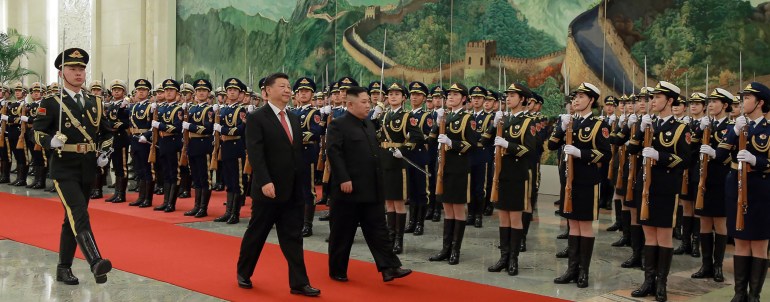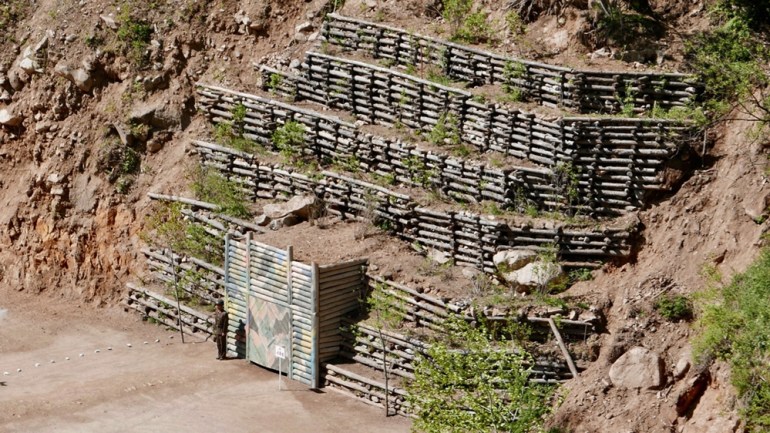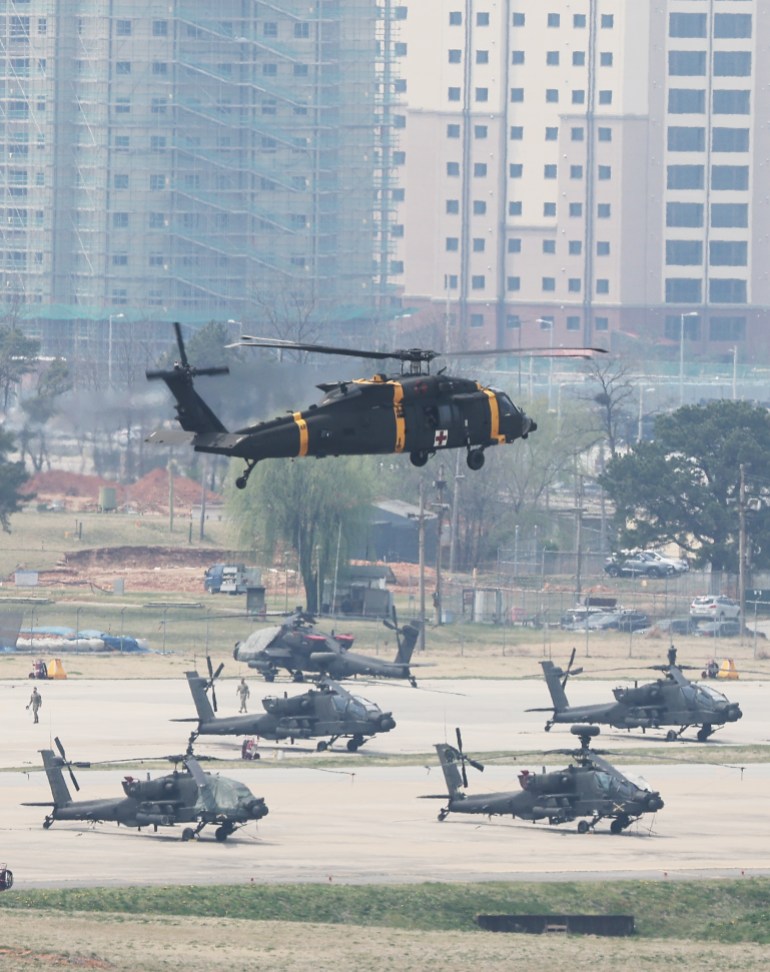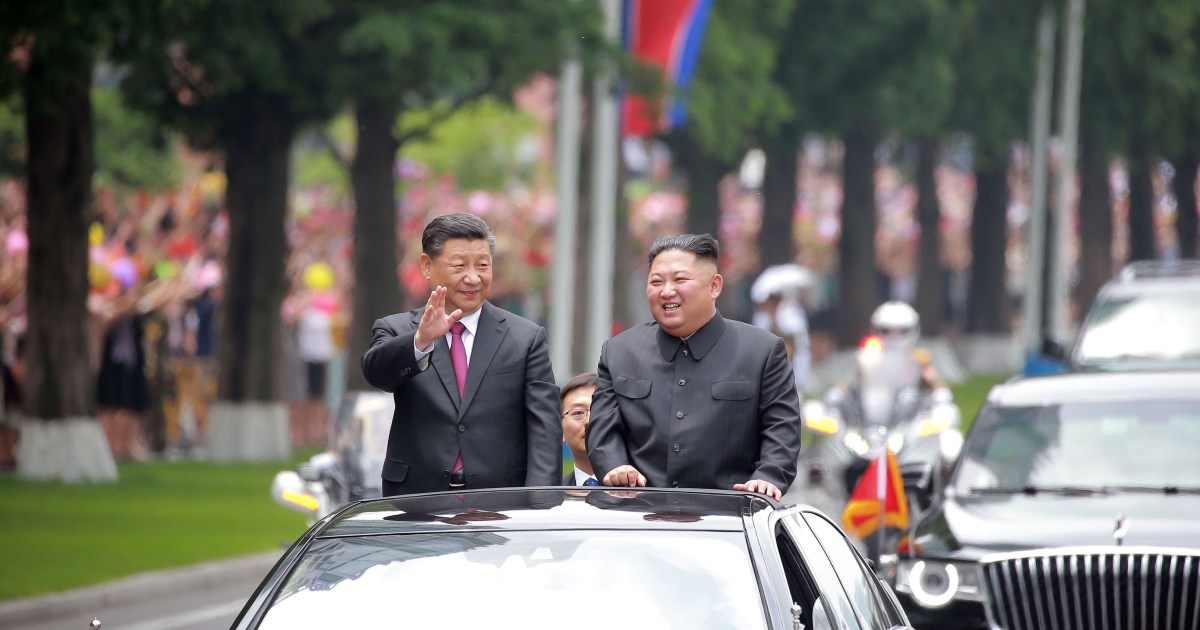Beijing quiet as North Korea turns up the heat with missile tests
As North Korea test-fired a new tactical guided weapon last week under the supervision of Kim Jong Un, its closest ally Beijing barely seemed to raise an eyebrow despite the high stakes.
Missile tests have taken place with increasing frequency in North Korea in recent months, but this time it was testing a new weapons system aimed at improving its nuclear capability.
North Korean media described the weapon as one of “great significance” that would drastically improve the “firepower of the frontline long-range artillery units and enhancing the efficiency in the operation of tactical nukes”.
The test, coinciding with the 110th anniversary of the birth of the country’s founder Kim Il Sung, also followed a series of launches this year that have raised alarm in South Korea and Japan, as well as in the United States. In March, the North test-fired an intercontinental ballistic missile (ICBM) for the first time in four years, breaking its self-imposed moratorium by firing off their “largest nuclear-capable missile,” according to NK News.
Satellite imagery has also shown renewed activity at the Punggye-ri nuclear test site, which was officially closed in 2018.
Following the tests, Beijing dispatched a special envoy to Washington this week, said Yun Sun, director of the China Program at the Stimson Center in Washington, DC, but it has also been holding back as it bides its time with the US and South Korea.
Leif-Eric Easley, associate professor of international studies at Ewha Womans University in Seoul, notes the contrast with previous incidents when China has stepped in as the middleman between North Korea, South Korea and Seoul’s close ally, the US.
“In the past, China constructively hosted the Six-party Talks and was willing to join UN Security Council sanctions against North Korea’s nuclear and missile programmes. But now Beijing is hardly pressuring Pyongyang on denuclearization or returning to diplomacy,” Easley said.
Historic ties
As two of the few Communist countries left in the world, North Korea and China are each other’s only treaty allies, and Beijing yields enormous influence over the deeply isolated nation. China played an instrumental role in helping North Korea push back US-led forces during the Korean War, and the two sides have maintained close ties ever since.
China is North Korea’s most significant source of trade and economic assistance, and its importance has grown since the collapse of the Soviet Union in 1991. While new sanctions dealt a serious blow to cross-border trade in 2018 before the pandemic, informal trade continued while North Koreans worked in Chinese factories just over the border in Dandong.
In January, cross-border trains resumed service, bringing goods north from China, probably to meet food shortages exacerbated by Pyongyang’s decision to close its borders when COVID-19 first emerged.
Yun, who is also a senior fellow and co-director of the East Asia Program at the Stimson Center, said the ongoing competition between Beijing and Washington “means China is hoarding strategic leverage, and its relations with North Korea, and potential influence.”

While always tense, relations between the US and China soured under the presidency of Donald Trump, and they have not markedly improved since President Joe Biden took office last year. Now, she tells Al Jazeera by email, Beijing has “less incentive and willingness” to act.
Isaac Stone Fish, founder and chief executive of the China-focused research firm Strategy Risks, agrees. “I think North Korea is trying to get attention for what it wants, and China would love for other countries to give it to it,” he told Al Jazeera. “It just doesn’t want to have to do it itself.”
The US imposed a new round of sanctions in early April following the ICBM tests, but Stone Fish says North Korea’s leader is hoping for financial support in exchange for halting tests.
Pyongyang has traditionally used tests to extract diplomatic and financial concessions and was often successful.
Sung-Yoon Lee, a Korean Studies professor at Tufts University in the US, told CNBC in 2017 that Pyongyang had extracted close to $20 bn in “cash, food, fuel and medicine” from South Korea, Japan, the US and China in the previous 25 years.
A flurry of summits after North Korea’s 2017 nuclear tests finally broke down when Pyongyang demanded sanctions be lifted completely, suggesting to some experts that their motivation may have in part been financial.
China may have been wearied by some of its neighbour’s manoeuvring, and Beijing’s top leaders have their own domestic challenges, including the worst COVID-19 outbreak since the virus first emerged in Wuhan in late 2019. Forty-five Chinese cities, including its important economic centre of Shanghai, are under partial or full lockdown as authorities continue to pursue a policy of “Covid Zero.”
China’s leadership is also gearing up for the all-important National Party Congress in October, when major policies will be set for the next five years.
“Beijing is focusing on Covid, but also there’s a lot of political jockeying going on among elite politicians in China right now because there are a lot of very important positions up for grabs,” Stone Fish said.

Chief among them is Chinese President Xi Jinping, who is set to secure a third and unprecedented term in office after removing term limits in 2018.
But analysts say while Beijing can remain quiet for now, it may be forced to act if North Korea resumes nuclear testing, which has been suspended since 2017.
More tests expected
Pyongyang oftentimes tests and displays new weapons to coincide with important national holidays, and attention is now focused on April 25, when Pyongyang marks the anniversary of the Korean People’s Army.
North Korea did not hold a military parade during last week’s celebration of Kim Il Sung’s birth as many had expected, despite signs of practices taking place on the parade ground. Experts say the evidence suggests the event may instead take place on the military anniversary.
For now, Beijing continues to walk a fine line – hoping Washington remains distracted by North Korea and the war in Ukraine while the situation on the Korean peninsula does not become so tense that Seoul and Tokyo feel backed into a corner.

Incoming South Korean President Yoon Suk-yeol is expected to take a more hawkish approach towards North Korea than current President Moon Jae-in.
He has already indicated that he wants to expand US-South Korean military drills and also install additional Terminal High Altitude Area Defense (THAAD) anti-missile launchers on South Korean territory.
Japan’s ruling party, meanwhile, has called for the country to raise defence spending to 2 percent of gross domestic product in response to changing dynamics in the Asia Pacific. Together, the two countries host nearly 80,000 US troops at military bases built at the end of World War Two.
Stone Fish says such developments are potentially concerning for China as well as for North Korea because the US could use the opportunity provided by regional concern about the North to try and further contain Beijing’s reach.
This week the US began a nine-day joint military exercise with South Korea, while earlier in the month the US, Japan, and South Korea held joint naval exercises.
“It’s in China’s interest for the US to be distracted,” Stone Fish said. “It’s not in China’s interest to have a regional military build-up in South Korea and Japan that people pretend is just about North Korea, but it’s actually also about countering and constraining China.”



